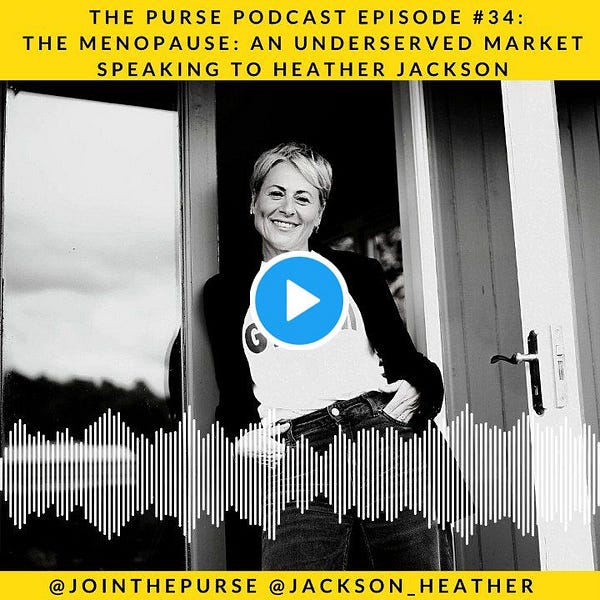Welcome to our #78 weekly newsletter.
“For women taking control of their financial future”
-Jana Hlistova
From The Purse
In this week’s newsletter, we focus on the menopause; why this is an underserved market, the costs to women, businesses and society and what can be done about it.
And 48% of women in the UK are buy-to-let investors. We highlight some key stats and explain what buy-to-let investing is.
You can review the news in brief so you stay on top of global financial, economic and investing trends.
And don’t forget to listen to The Purse Podcast with Heather Jackson, the Co-founder of Gen M. We talk about the menopause, how big the market is, why it is an underserved market (and the associated costs), the opportunity for businesses, and what women can do as they ‘transition’ to the next phase of their life.
Stay safe everyone & look after yourselves.
I hope you enjoy this week’s newsletter.
Until next week,
Jana
The menopause: an underserved market
“.. we all (should) wake up, smell the coffee and support this incredible audience of women who would deserve to be better looked after” Heather Jackson
The menopause: sometimes referred to as ‘the change’, is a condition women have had to suffer through in silence for generations.
It is still considered taboo.
And based on research, only 36% of women feel moderately prepared or prepared for menopause. In fact, most women can not name the 48 symptoms of menopause (read about them here).
According to the Invisibility Report, 14m working days are lost in the UK each year to the menopause.
As Heather Jackson (Co-founder for Gen M) said on The Purse Podcast:
‘Financially, business-wise, retail-wise consumer-wise, you name it, in every which way…we've been underserved.’
Heather adds:
‘If you think that in the UK, there’s 1.2% vegans in this country… we know how much money is spent on understanding that market, marketing to them, creating products for them, servicing them. But let's remind ourselves that's 1.2% of the population, right?
20% of the population is menopausal and how much time, effort by businesses, by retailers is being put into understanding, seeing, feeling, and reaching out to the needs of these women?’
The costs to women and businesses (are real)
It costs women an average $20k in trial-and-error spending on prescriptions, doctor visits, treatments, devices and products.
Many senior women leave the workplace in their 50s because of the menopause- whether they are aware of it or not. Ironically, this is often at the peak of their career.
Meanwhile businesses haemorrhage talent and money (because of it). And often are in the dark about the real reason senior women are leaving the workplace.
And the highest rates of suicide and divorce is for women aged 51-54 years-the menopausal age.
Coincidence? We don’t think so.
What is the menopause?
Menopause is when a woman stops having periods. And it is diagnosed after a woman has not had her period for 12 months. The average age of menopause is 51, but most women enter this phase in their 40s or 50s.
Heather goes on:
‘..no one says it takes you 10 years to get to that stage. And the 10 years in between…are so fluctuating on your hormone levels… (and this impacts your life)…’
Here’s a list of key data points:
13m women currently in menopause (UK).
1bn+ women globally will be in menopause by 2025.
But, even though women control 80% of all healthcare buying and usage decisions in a $3.5tn healthcare industry…
…the menopause market is hugely underinvested.
80% of health VCs (mostly male) have never invested in women’s health. And reproductive healthcare still makes up 95% of the femtech investment space.
The menopause market only makes up 5% of femtech investment (despite it being valued at $600bn, according to the Female Founders Fund).
But Heather believes that brands and organisations are sitting on the menopausal pound.
That is, untapped revenue from existing products and services that are unknown, unappealing or miscommunicated to women. Or because women are simply unaware they are going through the menopause.
As Heather says: we need to solve the ‘awareness’ problem first.
Solutions menopausal women are looking for fall into 4 main areas:
Telehealth /Medical Platforms
Products
Supplements
Community/Content Solutions
Support in a change in lifestyle, diet and exercise are (also) crucial ‘solutions’ for women going through the menopause.
So what can existing businesses do?
At a basic level, companies can introduce a menopause policy.
Heather goes on to say:
‘….brands need to understand their audience, understand the menopause symptoms and more about the merchandise range they have…They've got marketing budgets that we can only dream of. They've got product development with brilliant creative people to come up with (new) products…’
Gen M, the menopause partner for brands and organisations…
…helps them to understand menopause and get them to signpost to (for example):
‘climate control bedding, makeup that doesn't run down your face when you're on a zoom call or bras that accommodate the different fluctuations of your boobs’.
***
Here’s what to do next:
Go to the Gen M website
Read the Invisibility Report
Listen to The Purse Podcast interview with Heather Jackson
Find out if your employer has a menopause policy
If you run a startup or business, make sure you have a menopause policy.
News in Brief
Financial news
China’s GDP grew 7.9%, in the second quarter; retail sales beat expectations.
US Federal Reserve Chairman Jerome Powell said Wednesday the economy is ‘a ways off’ from where it needs to be for the central bank to change policy.
US inflation rose to 5.4% in June (annual rate), as used car prices picked up quickly. The Fed still considers inflation to be temporary.
UK inflation rises sharply to 2.5% in June (the highest level since August 2018). And the Bank of England (BoE) said that the monetary policy may be tightened sooner than expected (eg rise in interest rates). Inflation could peak at 4%.
UK payroll numbers rise as economy reopened.
Women unlikely to catch up with men on FTSE 350 boards until 2036, according to report.
Crypto: bitcoin, ethereum & DeFi
Ethereum ETF to list on Brazil’s stock exchange. QR Capital will buy ether and offer investors exposure to it without them having to worry about wallets or private keys.
S&P Dow Jones Indices launches new cryptocurrency indexes. The S&P Cryptocurrency Broad Digital Market Index, or BDM, tracks more than 240 digital assets at launch and represents an expansion of the firm’s recently launched crypto benchmarks.
Payments company, Square is building a DeFi, (decentralised finance) business using bitcoin. DeFi applications allow for financial transactions that are more easily accessible, efficient and relatively low cost.
Shares in Picasso painting go up for grabs at $6,000 in blockchain sale. ‘This marks the first time the ownership rights in a Picasso, or any artwork, are being broadcast onto the public blockchain by a regulated bank..’
Met police seize record £180m of crypto in London.
Women are buy-to-let investors
And their buy-to-let income is increasing twice as fast as men’s
Even though women make up just 15% of the workforce in the property and construction sector, women now make up 48% of buy-to-let investors in the UK.
Buy-to-let investing is…
…buying a property in order to rent it out (to a third party), for regular monthly income (and a return on investment). The monthly rental income is also referred to as passive income.
The idea is for the cost of the mortgage (and any monthly expenses incurred) to be covered by the rental income. (Although most buy-to-let investors aim for a monthly rental premium).
The value of the property may also go up, but factors including the location often determines the price.
In simple terms, the higher the rental income relative to the price of the property, the higher the yield or return for the buy-to-let investor (assuming costs stay the same).
The buy-to-let mortgage works differently to a residential mortgage. Most lenders require a minimum 25% deposit (UK) and consider the monthly rental income and personal income. The minimum personal income must be between £20,000-£25,000.
Landlords now face a 3% stamp duty surcharge on second home purchases. And mortgage interest payments can no longer be offset against the income tax that is paid on collected rent.
Women investors: here are some key stats..
the number of number of residential property landlords who are women increased to 1.25m from 1.2m in 2020.
…And based on research by real estate agency ludlowthompson (UK), women’s buy-to-let income:
is increasing almost twice as fast as men’s (27% vs 15% in the last 5 years)
has drastically increased to £16.1bn (vs total income £36.4bn)
Women prefer property investment…
..because it is often associated with stability, minimal volatility and investing for the long-term. (In fact, research suggests that younger women buy their first residential property before younger men do).
But according to Rob Dix, co-founder of Property Hub, the increase in income among female buy-to-let investors may be the result of tax planning among couples.
However, what is obvious from the data is that women investors are generating income and wealth, in their name.
What next?
The Purse Podcast


The menopause: an underserved market
We cover the following in out conversation:
What is perimenopause and the menopause?
How big is this market?
Why is it underserved & what are the costs?
What are the 48 symptoms of menopause?
Gen M: the menopause partner connecting brands and organisations
What can businesses and employers do to support women?
What is the opportunity for businesses?
Heather's approach to starting her business and investment.
Advice for women and how their loved ones can support them.
Listen on all podcasting channels including Spotify, iTunes and Anchor.
Coffee Break? Read This
We’d love to hear from you. Get in touch with Jana via the The Purse website or tweet @jointhepurse and @janicka.
The Purse Ltd. Copyright 2021 & All Rights Reserved.
The Purse provides content for informational purposes only, we do not recommend products or services or provide investment advice. Please do your own research or speak to a financial advisor.

















Share this post